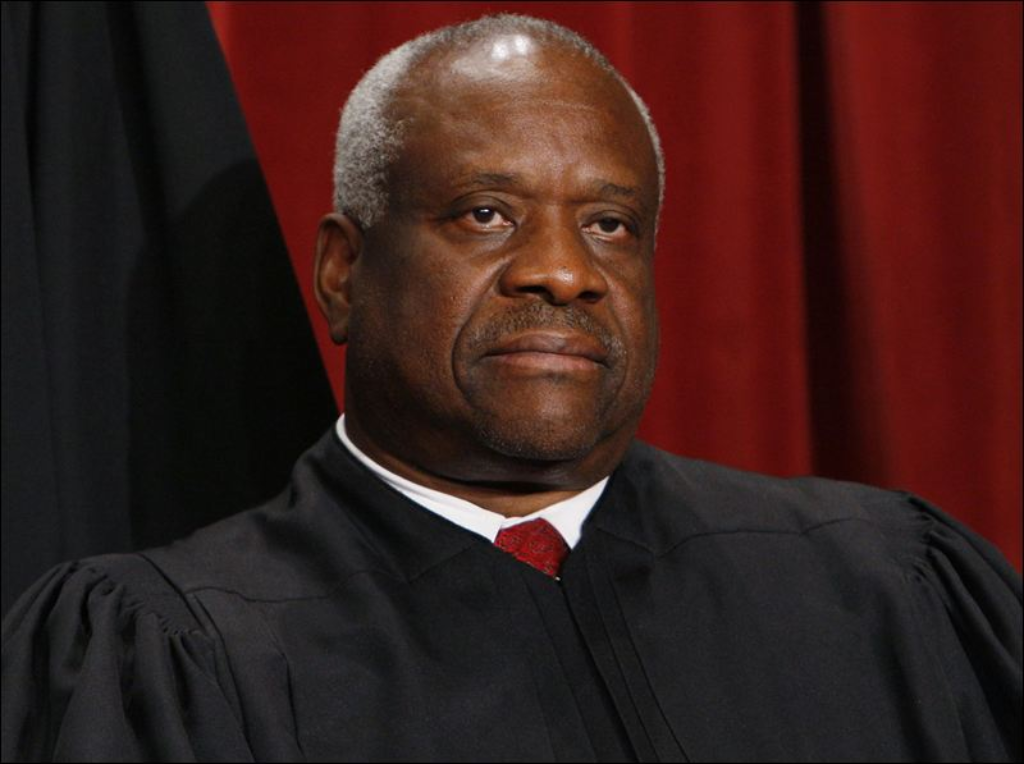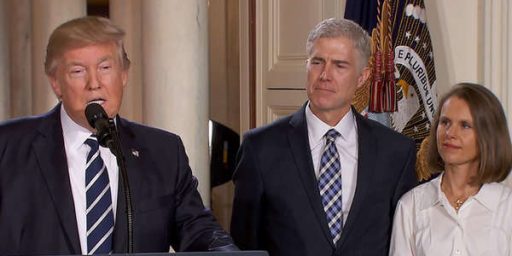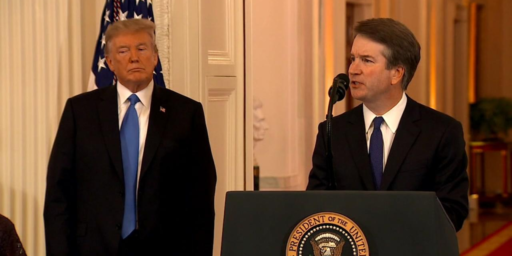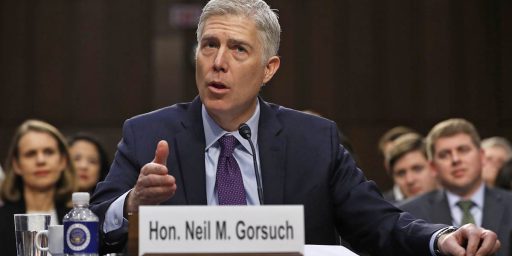Another Possible Supreme Court Retirement?
Supreme Court watcher Jeffrey Toobin speculates that Clarence Thomas could be the next Supreme Court Justice to step aside.

In The New Yorker, Jeffrey Toobin speculates about the possibility of a Supreme Court retirement in the coming months, but it’s not Ruth Bader Ginsburg:
The more complex drama involves Clarence Thomas, who is seventy years old and the longest-tenured Associate Justice on the Court. With fifty-three Republicans now in the Senate (and no filibusters allowed on Supreme Court nominations), President Trump would have a free hand in choosing a dream candidate for his conservative base if Thomas were to retire this year. The summer of 2019 would seem an ideal time to add a third younger conservative to the Court (along with Neil Gorsuch, who is fifty-one, and Brett Kavanaugh, who is fifty-four). It’s true that Mitch McConnell, the Senate Majority Leader, would likely violate his Merrick Garland rule and try to push through a nominee in 2020, an election year, but 2019 would be much easier to navigate. So, many conservatives are asking, why shouldn’t Thomas leave now?
It seems that the President may have had the same thought. Trump has shown unusual solicitude for Justice Thomas and his wife, Ginni, a hard-right political activist. The President and the First Lady had the Thomases to dinner, and then Trump welcomed Ginni and some of her movement colleagues to the White House for an hour-long discussion. Even in a conservative White House, Thomas and her team presented some outré ideas, like opposing same-sex marriage and questioning the ability of women to serve in the military. But the President listened as the group asked that more of their allies be given jobs in the Administration. Trump rarely engages in this kind of cultivation, and it’s reasonable to speculate that he’s trying to persuade the Justice that his seat would be in good hands if he decided to leave.
But will Thomas retire? Over the years, he has made little secret of the fact that he doesn’t enjoy the job very much. With a conservative future of the Court secure, why wouldn’t he call it a day after twenty-eight years? Because, according to his friends, he feels an obligation to continue doing the job for as long as he is able, regardless of the political implications of his departure. Of course, no one except Thomas knows for sure what he will do, and that leaves his decision open to speculation.
Ever since Donald Trump took office, there has been at least some speculation that Justice Clarence Thomas might take the opportunity presented by the election of a Republican President and a Republican-controlled Senate to step down. While Thomas is younger than Ginsburg, Kennedy, and Breyer, he is 70 years old and has been on the Court for 27 years so a retirement on his part would not be a complete surprise. Additionally, as Toobin notes, Thomas has reportedly expressed the desire to possibly step aside earlier than some recent Justices have so that he could spend more time with his family and grandchildren. That opportunity didn’t present itself in 2017 since the Senate was dealing with the Gorsuch nomination, and the same was true last year when Justice Kennedy, who had been on the Court longer than Thomas at the time he retired. Arguing against the possibility of a Thomas retirement is the fact that he has hired a full slate of law clerks for the October 2019 term. This is typically an indication that a Justice is not intending to retire, but it has not always been a reliable indicator. For example, Justice Kennedy had hired a full slate of clerks for October 2018 long before ultimately deciding to retire last June. While it’s not at all clear that Thomas actually will retire, though, it seems likely that it would happen during this term rather than in 2020 when attention will be focused on the upcoming election. So, we’ll just have to wait and see.
As Toobin notes, it seems pretty clear who Trump would be likely to turn to:
There seems little doubt, however, about what would happen if either he or Ginsburg leaves in the next year or two. The President would likely nominate as a replacement Amy Coney Barrett, a forty-seven-year-old judge on the Seventh Circuit. A former professor at Notre Dame Law School, Barrett was nominated to the appeals court by Trump, in 2017, and she has already been considered for a Supreme Court seat—the one that went to Kavanaugh. Her politics appear even more conservative than Kavanaugh’s or Gorsuch’s; she has been open in her disdain for the concept of abortion rights for women. She is a devout Catholic and has, in the past, expressed a willingness to overturn precedent, which some observers think make her even more certain than Kavanaugh and Gorsuch to vote to overturn Roe v. Wade. (Last week, both Justices voted in favor of enforcing Louisiana’s abortion-clinic law, which would restrict access to the procedure; Chief Justice John Roberts’s vote, joined by those of the Court’s four liberals, blocked it.)
Barrett’s personal story is ready-made to weather a Supreme Court confirmation battle. She has seven children, two of them adopted from Haiti and one with special needs. She clerked on the Supreme Court, for Antonin Scalia, and won accolades from her students at Notre Dame. Whatever views she has expressed in the past, she looks like a difficult nominee to defeat, particularly with a loyal Republican majority in the Senate.
Judge Barrett graduated from Rhodes College in Memphis, Tennessee and from Notre Dame’s Law School after which she eventually became a Law Professor at Notre Dame before being named to the Seventh Circuit. Her judicial record is rather thin but she has a long record of academic writing that would likely become an issue were she selected by the President. She has been on Trump’s list of potential Supreme Court nominees since the campaign and it has been apparent from the start that she was being groomed for a seat on the Supreme Court. During Trump’s search for a replacement for retired Justice Anthony Kennedy, she was reportedly among the final three candidates that the President was considering but that he ultimately decided to go with the seemingly safe choice of then-Judge Brett Kavanaugh due to the fact that Barrett’s conservatism would have become lightning rod for controversy given who she would be replacing. Since then, there has been speculation that Trump might name her in the event that Justice Ginsburg’s seat opened up, but it’s obvious that selecting her for that seat would be even more controversial than selecting her for Kennedy’s seat would have been.
Much of this concern would not be an issue if Barrett were named to replace Justice Thomas, of course. Instead, we would have roughly the same situation we had in 2017 when Justice Neil Gorsuch was named to replace Justice Scalia. In that case, a conservative Judge was being nominated to replace a conservative Justice and the same thing would be happening if Barrett or any of the other people were named to replace Thomas. Other than the fact that someone as young as Thomas could potentially be on the court for the next 30-35 years, her presence in Thomas’s place would do nothing to impact the ideological balance in most cases. Therefore, I would not be surprised to see her selected in the event of a Thomas retirement and that a potential Ginsburg retirement be reserved for one of the other people on the White House short list, although there would likely be some pressure in that event to name another woman to replace her just as there was some expectation when Thomas was named that George H.W. Bush would look to an African-American to replace Justice Thurgood Marshall.
Of course, it’s possible that Trump would select someone else on his list if Thomas were to retire. Specifically, he could turn to a minority such as Judge Amul R. Thapar, who is 49 years old and served as a District Court Judge in Kentucky from 2008 to 2017 and has been on the Sixth Circuit Court of Appeals since May 2017. Judge Thapar would be the first Indian-American and the first Asian-American on the Supreme Court, thus continuing in some sense the tradition for this seat that began when President Johnson nominated Justice Marshall for this seat. It’s also possible that Thomas won’t retire and this is all an entirely academic argument. As with Justice Kennedy, this will all have to wait until the end of the term to see what happens.




Has anyone checked to see if Thomas is still alive?
In 2024, someone 50 will have been born in 1974. I’m trying to imagine a Republican running for office who is 50 and born in 1974. What would this person even say about climate change or race and class? Free market good, big government bad? Are they going to cite the Bible as a very useful tool for navigating life, especially for gay people? Since the Cold War ended, the Republicans been running on the idea that the Democrats will clean up their messes, so it’s great to pander to the Silent Majority forever. Create a mess and trust the idiots to forget who did it. If Democrats get in 2020, this will not happen again. The next two years is going to be about getting as many hacks into unelected power as possible.
Likely? As likely as the sun rising in the east.
@gVOR08:
If Thomas were to step down this year, the so-called “Garland Rule” would not apply because 2019 is not an election year.
Wouldn’t surprise me in the slightest if Thomas waited until 2020 to retire just so McTurtle could “own the libs” by confirming a SCOTUS pick in an election year.
@Doug Mataconis: The Garland Rule also only applies to nominees of Democratic Presidents.
I don’t imagine good things coming from a new tradition of justices resigning to ensure their replacement is of a specific party.
The Supreme Court locked in place ideologically for decades, only changing if someone ends up dying unexpectedly in a traffic accident or something…
@Doug Mataconis:
I assume you are joking here, because we all know the Garland rule was never meant to apply to Republican appointments
@Gustopher:
It will enforce the actual Garland rule: the next time the Dems have the presidency and the Senate they should pack the court.
@Gustopher:
The “Garland Rule” was nothing but a political gamble that the GOP could have easily lost. They didn’t.
Don’t hate the player, hate the game.
@Doug Mataconis:
No, that’s not right. There is no opt-out from basic human decency and fairness. A corrupt game does not justify or mitigate individual corruption. Jim Crow was a game, rightly hated, but people who exploited that system are not without individual guilt. If people took responsibility for their own actions we wouldn’t have corrupt games to begin with. So ‘hate the game’ becomes a self-licking ice cream cone: corrupt individuals foster a corrupt game, which excuses more individual corruption, which in turn reinforces the corruption inherent in the game.
Amazon played the ‘tax game’ and managed to pay zero federal taxes. Are they morally in the clear? No. No, they are not. They are using systems without paying for them. They are therefore shifting costs from themselves onto other taxpayers and that, given their profits, is immoral.
@Doug Mataconis:
It’s very hard to change the game. We may be able to change the players.
@Michael Reynolds:
We’ve had this discussion before so I’m reluctant to dive into it again but, here I go nonetheless….
After Scalia died, the GOP took the political gamble of keeping the seat open until after the election on the hope that a Republican would win in 2016. At the time, this seemed to me like an unwise bet given the polls, but they made the gamble and they won. It’s called politics and there is nothing in the Constitution that prohibited them from doing it. Heck, they could have just gone ahead and given Garland a vote, rejected his nomination (which likely would have happened given the GOP majority) and then let the seat stay open until after the election. They chose a more aggressive approach that turned a lot of people off, but the fact of the matter is that they were under no obligation to hold hearings for the nomination or subject it to a floor vote. As I said, I didn’t think it was a wise political move because I thought HRC would win the election and, most likely, appoint someone far younger and far more liberal than Garland. Instead Trump won, and he appointed Gorsuch to succeed Scalia.
This is a Supreme Court nomination and this is politics. Elections have consequences and, thanks to the 2014 elections the GOP controlled the Senate. This isn’t a matter of morality or “fairness” and rhetoric like that makes me think that Democrats would have celebrated the confirmation of Merrick Garland confirmation with a parade of unicorns down Constitution Avenue. This isn’t tiddlywinks, it’s politics. Like it or not, this is how the game is played.
I’m sure I’ll get down voted for this, but such is life.
Indeed…which is why the Democrats must pack the court as soon as they have the opportunity to do so…
Good piece in NYT today on just what a spitweasel McConnell is.